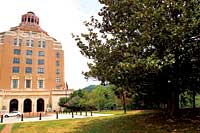George Willis Pack (1831-1906) was a great benefactor of Asheville and Buncombe County. He and his father had made a fortune logging in Michigan, and when Pack moved to Asheville in 1885, he was determined to repay his perceived obligation to the society in which he had prospered. He would do it with public works.

George and his wife, Frances Pack, bought thousands of acres in and around town, and his extensive philanthropy soon made him Asheville’s best-loved resident. Hence we have Pack Memorial Library, Pack Square and the site for the Buncombe County Courthouse and Asheville City Hall, together with the park that fronts both buildings. The land for the downtown park, buildings and Vance Monument was conveyed to the county in two deeds Pack executed in 1901.
Fast forward to last November, when the Buncombe County Board of Commissioners sold a piece of Pack’s property to developer Stuart Coleman, who intends to use the land for construction of a high-rise, mixed-use building. Commissioners have said they were unaware that they were selling parkland. In the process, they may have violated conditions of Pack’s deeds.
Going once, going twice
Back in 1901, the Buncombe County Courthouse was a rickety frame building badly in need of replacement. Records show that Pack purchased most of the surrounding land from “Allen T. Davidson and wife” in 1890, and in July of 1901, he executed a deed to the county which stipulated that the courthouse be torn down and a new one constructed elsewhere on the parcel by Jan. 1, 1903, “provided that the County will dedicate [the rest of the land] to the public forever to be used for purpose of a public square.”
The July deed contained other stipulations, including that no jail be built on the parcel and that “no part of said lands shall ever be sold or conveyed or rented or leased” by the county, “nor shall said property be used for any other purposes than for a Court House and County offices and such, other purposes strictly incidental to the usual and convenient occupation and use of said Court House and County offices by the County officials and the public.”
While the deed conveyed use of the property to the county, it retained actual ownership for Pack and his heirs. If the restrictions of the deed were violated, the land would revert to family control.
Something happened to change Pack’s thinking between July and December of 1901, and he executed a second deed that rescinded most of the conditions in the first. What remained, however, were conditions about the use of the land. He conveyed the parcel “for the following and no other purpose, to wit; that is to say, for the site of a County Court House, County offices and such other purposes strictly incident to the usual and convenient occupation and use of said Court House and County offices by the County officials and the public.”
So while the second deed didn’t retain ownership rights for Pack, it would appear to maintain the stipulation of public use.
Asheville attorney Joseph Ferikes, who has been hired by one of Pack’s heirs to examine the deeds and their import, says that while it is unusual to find two deeds conveying the same property from and to the same parties, it isn’t unheard of. In this case, the first deed retained ownership rights while conveying rights of use, and the second transferred the real property. “The second deed was obviously done to change something, but what was changed is hard to determine,” Ferikes says.
When Barbara Park Holcombe, the Pack descendant who hired Ferikes, questioned the Buncombe County Board of Commissioners about the sale during the board’s Aug. 21 meeting, Chairman Nathan Ramsey said he believed the county’s right to sell the property to Coleman rested on the second deed.
Ramsey suggested that the sale was a fait accompli, and that the only way the county could recover the land was to condemn the property and seize it via the power of eminent domain.
While deed restrictions are routinely conveyed with land, they are not immutable. Ferikes told Xpress that there is a rule against perpetuities that prevents landowners from installing eternal restrictions on their land in some situations. Whether that rule or the language of Pack’s deed will prevail may prove to be a matter for courts to decide. Holcombe declined to discuss whether or not she will sue the county, pending the outcome of Ferikes’ research into the matter.
Though Ramsey believes the county acted within its rights in selling the property, he did comment at the commission meeting that “we didn’t act in the spirit of Pack’s deed.”
In an e-mail written in early July, Commissioner David Gantt put it more succinctly, saying, “We screwed up.”



One merely needs to look around Asheville to see that there was no “screw up”,they just didn’t think anyone would notice.Once again,short-sighted revenue thirsty politicians do what they do best.
I’m afraid the rule against perpetuities is probably germane to the Pack conveyance, although people die and corporations can live forever. It seems a crying shame for the county to sell green tree-lined land intended as a public park to a hungry private developer like Coleman.
What if New York City began selling off beautiful Central Park to be raped by private developers? That would be crime against humanity and an ultimate hubris like Icarus defying the gods.
To slithery politicians such as your typical run-of-the-mill myopic county commissioners, nothing is sacred, nothing safe from the developer’s bulldozers. Next election I’ll be keenly remembering what they did.
Selling this land for any reason is outrageous, but selling it to a developer is appalling. The historic City Building should be seen unencumbered by commercial development. If Barbara Pack Holmcombe wants help with legal fees, I feel sure Asheville’s citizenry will donate to a legal fund to protect this heritage.